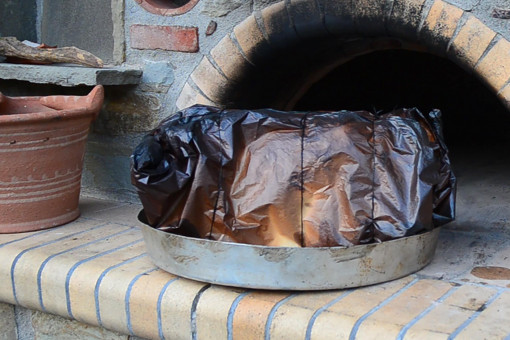INGREDIENTS
- 3 kg/ 6.6 lb pork offal (liver, sweetbreads, lungs)
- Processed intestines for sausage casing (adjust the amount accordingly)
- 50 g salt (preferably fleur de sel)
- 7 g black peppercorns
- 5 g coriander
- 10 g chili flakes mix (3 parts sweet chili flakes, 1 part hot chili flakes)
- 3 tbsp mild mustard
- 250 g spinach (without the stems)
- 2 handfuls of leek (finely chopped)
- 1 bunch of parsley
- 1 bunch of leaf celery
- 2 bunches of dill
- 300 ml extra virgin olive oil
- 250 ml white wine
- 150 g wheat groats
PREPARATION
Boil a large pot of water. Once you bring it to a boil, blanch the offal. Leave the offal in the hot water until foaming. Then, discard the hot water and rinse the offal with cold water. When it is completely cool, cut it into very small pieces - dice size. Then, finely chop all the herbs and vegetables. In a stone mortar, crush all of the spices along with the salt.
In a large, wide pot, add the olive oil. When it is fully heated, add the onion and cook it until it softens. Then, add the chopped offal and stir well until lightly browned. Pour in 250 ml of white wine. Remove the pot from the stove and add the spices while stirring.
Soak the groats for half an hour. In a large bowl, add the spinach, the leek, the soaked groats, and the herbs. Mix and add the mustard. Wash the intestines thoroughly and stuff them with the mixture. You need to be careful not to overdo it, though. Tie each end of the filled sausage casing and place the sausage in a clay baking tray, on top of grapevine twigs.
COOKING
After you have prepared the sausages, preheat the indirect wood-fired oven for the cooking session. In the fire chamber, place kindling and thin pieces of dry hardwood on top. Light the fire and add thicker pieces of dry hardwood on top. When the temperature reaches 200⁰C/392⁰F approximately and the fire has burnt down to embers, it’s time to cook the boubari sausages. Use a fine needle to poke holes in the casings to allow the steam to escape. Place the clay baking tray in the oven’s upper chamber and cook for 1.5 hours, approximately. Before placing it in the oven, you can mix two tablespoons of mild mustard and two tablespoons of olive oil and coat the sausage casings.
It’s served warm. It’s an excellent appetizer to pair with your wine and to share with your friends. Happy cooking with your friends!









